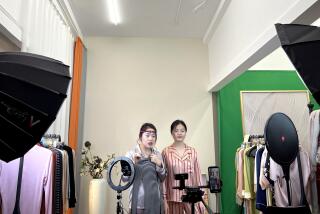Fair Featuring U.S. Products Wows Chinese : Trade: Sales of brands such as Avon, Coke and Campbell’s soup are triple what was expected.
- Share via
CANTON, China — Zhou Yunhua was all smiles after shelling out 150 yuan ($27) on an assortment of Avon facial products.
“The sales girl was very persuasive,” Zhou said, explaining why she just parted with one-third of her monthly salary.
“I’ve heard American products can make people look beautiful,” said Zhou, a 31-year-old shoe factory worker. “If it works, then it’s not expensive. But if it doesn’t, then it won’t be worth one yuan.”
Zhou is one of thousands in this southern city who have been checking out the likes of Avon, Coke and Campbell’s soup at the first-ever American consumer products fair in China.
Don’t say it too loud, but the one-month fair celebrates market-driven supply and demand in the world’s last great Communist state. And with more Chinese eager and able to spend on name-brand products, American companies are gladly obliging.
Fair organizers at the downtown Friendship Store have tacked up a huge red, white and blue billboard proclaiming “Grand Gathering of Beauties.”
That’s a double entendre meaning the United States--”Beautiful Country” in Chinese.
Inside, the third floor is chock full of Americana.
In a Nike video, basketball star Michael Jordan tells would-be athletes to “Just Do It.” Sales girls wearing black cowboy hats peddle Mazola corn oil and Skippy peanut butter. Five bar stools occupy the back corner, courtesy of Pabst Blue Ribbon beer.
In all, 15 American businesses have set up booths at the fair, which opened April 12. Other companies include the candy giant Mars Co., consumer products leader Procter & Gamble, RJR Nabisco and Kodak.
Friendship Store officials say up to 30,000 people have been visiting the fair daily, with twice that number on weekends. Sales have tripled expectations.
“We didn’t realize it would be this popular,” bubbled Wang Liangwei of the state-run retail outlet. “But you can see, people are buying because they just love brand names. Everybody’s heard of Coke!”
The Chinese can splurge because of a huge increase in disposable income since economic reforms were introduced in 1979. Savings have more than tripled since 1987 to $183 billion and are growing by 20% a year.
Guangdong Province, of which Canton is the capital, boasts the country’s highest per-capita income. During his recent trip to southern China, senior leader Deng Xiaoping urged Guangdong to experiment with even bolder economic reforms.
As such, the fair is a testing ground for American companies eager to supply some of the country’s 1.1 billion consumers.
Most of the firms represented manufacture their products in China for the domestic market. More companies are planning to set up shop, including Walt Disney Co. and the electronics maker Motorola.
There are problems, of course.
Businesses must contend with corrupt officials, distribution barriers that prevent goods from being sold nationwide and the negative image of being associated with a repressive political system.
Even so, most visitors have been impressed.
“This is very flashy,” marveled David Hu, a 23-year-old worker in a fast-food restaurant. “This is so full of imagination and quality.”
More to Read
Inside the business of entertainment
The Wide Shot brings you news, analysis and insights on everything from streaming wars to production — and what it all means for the future.
You may occasionally receive promotional content from the Los Angeles Times.










